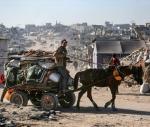You are here
From Gaza to Lebanon: Post-war realities, emerging threats
Jul 01,2024 - Last updated at Jul 01,2024
As Israeli discussions about the imminent end of military operations in Gaza within the next three weeks begin, the door opens again to debates about the post-war phase, the management of the Gaza Strip, and the supervision of humanitarian relief and reconstruction operations.
Despite the Netanyahu government’s rejection of any role for Hamas and Fateh in the post-war period, practical realities make it difficult to envision a future without imposing workable solutions.
Hence, Israel’s talk about accepting Arab forces in Gaza can be seen as part of the process of placing responsibility on the international and Arab community, considering that the end of the war necessitates a reality that requires the presence of forces on the ground under the banner of imposing stability, facilitating relief operations and establishing civil administration.
This Israeli position is not new; in the initial months of the war, this proposal was frequently echoed in diplomatic corridors.
Contrary to the idea of international forces imposing stability, Israel promoted the idea that it does not mind the presence of Arab forces under an international umbrella, especially from countries with which it has peace agreements and can easily coordinate.
Despite the complexities of this proposal and the difficulty of implementing it on the ground, Israel’s strategy of ignoring comprehensive solutions aims to impose a de facto situation and from there adapt to practical solutions.
Israel’s policy in Gaza, from destroying infrastructure to deepening the humanitarian crisis, has made the issue of “internationalising Gaza” inevitable.
This was clearly demonstrated in the humanitarian aspect and the relief operation for the Strip, which cannot be limited to the humanitarian level alone and must also include managing the administration and rebuilding of Gaza.
If we agree that the post-conflict phase requires imposing stability with the presence of international peacekeeping forces, this confirms that these countries may find themselves compelled under an international umbrella to be present on the ground, given that Israel only accepts these forces.
This aligns with Israel’s desire to impose a fait accompli policy to implement practical solutions.
However, while Israel wants to maintain the upper hand in controlling the borders and crossings and ensuring rapid intervention capabilities, the countries nominated for this mission may face a very costly reality.
Imposing stability in any form may lead to clashes with forces on the ground, including Hamas, which makes the overall situation ambiguous and fraught with risks.
Israeli discussions about a decline in military operations in Gaza within the next three weeks have begun, gradually shifting attention to the Lebanon front.
The rapid escalation there is seen as a natural consequence of “securing the geography” on which Israel based its war in Gaza.
In fact, Israel may not seek a major military escalation with Hizbollah, and preparing for war does not necessarily mean desiring it, but rather achieving its goals without engaging in full-scale conflict.
Israeli tactics clearly aim to push Hizbollah to withdraw from its positions in southern Lebanon and push it north of the Litani River. Thus, the immediate goal of the Israeli government is to reduce the threat from the north, create a buffer zone, and gradually return evacuated civilians.
However, in the current climate of war, the possibility of sliding towards open conflict remains very high.
The ongoing escalation may not secure concessions on the Lebanese front without confrontation.
Therefore, the prevailing war climate in the region may also push Israel towards striking Hizbollah’s infrastructure as part of a long-term deterrence strategy, focusing on stripping Hizbollah of any societal support inside Lebanon, and turning it into the main cause of the Lebanese tragedy.
This could shift the dispute internally within Lebanon and legitimise discussions about transforming Hizbollah into a political rather than a military entity.














Add new comment